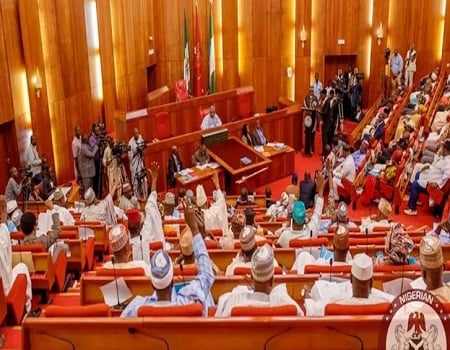The Senate has begun a process of providing a legal framework to guide electronic transactions in the country, through a bill sponsored by Senator Ibikunle Amosun.
The new law, “Electronic Transactions bill 2019,” being considered by the Senate has become necessary following the volume of daily electronic transactions which has reached sixty billion naira, the sponsor of the bill said.
Chairman Senate Committee on Capital Markets, Senator Ibikunle Amosun, said the bill seeks to provide the new legal framework that will embolden innovative creativity among businesses even as it would open up new areas of investment opportunity for our young population and start-ups that have suffered a lack of support from creditors and investors, due to the absence of this law.
He said the passage of the bill holds a lot of promise for the nation’s economy as the country now has the opportunity to see the emergence of a new generation online, electronic application giants.
Amosun said: “According to a CBN report, the value of electronic funds transfers in Nigeria has risen to Eighty Billion Naira daily.
ALSO READ: Buhari commissions flood, erosion control project in Bauchi
“The report further pointed out that in the first phase of the cashless policy, Nigerian Inter-bank Settlement System recorded over Twenty Billion Naira daily transactions by value, while the Nigerian Electronic Funds Transfer conducted about Sixty Billion Naira transactions daily. With the next phase which will include more states, electronic funds transfer would be on the increase due to expected changes which will ipso facto necessitate the use of electronic funds transaction channels.”
The bill which passed second reading he said would address critical components of the electronics transaction in the country especially on areas of confidentiality and make it boom in Nigeria.
His words: “A reflection on our laws will explain the challenges which must be addressed to create the legal environment to enable electronic transactions boom under an organised legal framework.
“The time challenge, the jurisdictional challenge in matters dealing with contracts that need to be in writing, the issues of mistake and misrepresentation must be addressed.
“How can the contract be authenticated? How do we guarantee the integrity, non-repudiation, confidentiality, writing and signature within the electronic commerce environment?
“All these issues need to be resolved by legislation to boost our economy, encourage foreign investment and ease transactions.
“This Bill is aimed to resolve these legal challenges by removing barriers to electronic commerce, while validating and effectuating electronic records and signatures.
“It is obviously not a general contracting statute, as such; subsisting laws on contracts are not affected. It is designed to support and complement substantive rules on contract.”
He said although Nigerians on daily basis are involved in electronic contracting, either through the use of the Automated Teller Machine (ATM) to transact business or when booking flight tickets online which are the ones the nation loose market can manage now, are not covered by our legal regime.
He pointed it that in the purchase of flight ticket, the contract is between man and machine and wondered how sustainable that would be when dealing on much larger deals.
“Can a man contract with machine under our present law? No. So, all such contracts are actually not covered by our legal framework.
“How can we now talk of contracts running into billions of dollars between two machines programmed to process sales and purchase orders? Such complex transactions cannot be contemplated in our present circumstances.
“Yet, if we must tap into the global market, we must move with the trend of the market, we must move with time and have in place a legal framework that will deal with issues such as this,” Amosun said in his lead submission.






